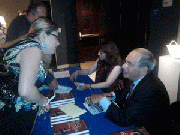DEARBORN – The Arab American National Museum hosted Roving
Ambassador for Special Missions for the PLO Afif Safieh for a discussion on
Saturday, June 4, as part of a national tour for his new book “The Peace
Process: From Breakthrough to Breakdown.”
The event was presented by the ADC’s Greater Detroit Chapter
and the Palestine Cultural Office of Michigan and attended by about 60 guests.

|
| Roving ambassador for special missions for the Palestine Liberation Organization Afif Safieh speaks with a guest. Photo courtesy of David King |
Safieh’s book includes a collection of lectures and
interviews from 1981 when he was a staff member in Yasser Arafat’s Beirut
office until 2005 when he finished his mission in London, centering on
Palestine’s struggle for freedom from occupation and shedding light on
diplomats’ discussions.
He spoke about his ups and downs as a diplomat for more than
30 years.
“After decades of regime changing, history is on the
move (in the Arab world), this beautiful mostly non-violent change is occurring
but again history is undecided; we should be on the right side of it,” he
said.
Safieh, who is also the Fatah Deputy Commissioner for International
Relations to the U.S., said that the Arab American community has a role to
play.
“This is a wonderful location…I personally believe
the Arab American community has a great role for accomplishing change. The ADC,
museum, and many other endeavors have a hand to help us make our history and to
make the right choices.”
While Safieh is encouraged by the Arab Spring and its
potential to help bring about the liberation of Palestine, he also spoke of
difficult moments as a diplomat.
“The most painful was the 2007 partition of the West
Bank and Gaza,” he said.
He also took issue with settlement building and home
demolitions.
“It is not terrorism but the territorial appetite of
Israel that is the obstacle to peace, and international observers admit it,”
he said.
He said that U.S. President Barack Obama and Special Envoy
to the Middle East George Mitchell were “sabotaged” by Secretary of
State Hillary Clinton and diplomat Dennis Ross in their quest to stop
settlements, which led to the latest in a long line of “breakdowns”
of the peace process in keeping with the theme of the book.
In terms of helping to bring about change and supporting
Palestinian freedom, Safieh said that he believed strongly in the non-violent
resistance movement and Boycott, Divestment and Sanctions initiatives.
He said that American churches and many American Jews are
starting to become aware of the plight of the occupied Palestinians and that a
movement can be created.
“I think the majority of American Jews don’t believe
AIPAC represents their interests anymore,” he said.
“We need for Arab Americans and Muslims to have a
voice, we have to ignite a moral crisis.”
He noted that in 2006, a Washington Post poll showed that
2/3 of voters believed that Israel was “totally unjustified” in its
bombings and attacks against Lebanon, but said that there were no state
department representatives who sided with the people in that case.
But he thinks that strides can be made in politics if a
majority of people begin to side with oppressed Arabs in the region. He said
that activists should push for an “Eisenhower moment” like when he
was able to get Israeli Prime Minister David Ben-Gurion to withdraw from
Egyptian territory.
“I believe Obama and the administration, people such as
General (David) Petraeus, are becoming increasingly aware that Israel is more
of a burden and liability than anything else,” he said. “I still
believe the battle for Washington is winnable.”






Leave a Reply